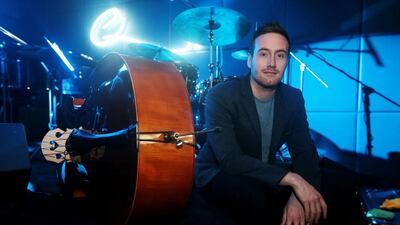The first resident act at Quincy Jones’s first jazz club, Q’s, was not chosen lightly.
Picking Ollie Howell to perform nightly at his new flagship venue, at Palazzo Versace Dubai, was just the latest twist in a relationship between the 28-year-old British drummer and the 83-year-old American icon that goes back years.
Howell credits Jones with inspiring him to form his own band, start writing his own music and live through the uncertainty of years of brain surgery. In return, Howell repaid the favours by presenting a recent BBC radio special about Jones’s life.
“Spending one minute with Quincy is enough to feel like I can die happy now,” says Howell, taking a seat in the bar where he has been gigging five nights a week since mid-November.
“Fortunately, I’ve spent quite a bit of time with him over the years, and every time is like a dream come true.”
Of course, for a jazz musician, there are few greater endorsements than that of Jones – an icon whose contribution to the genre stretches from the embryonic 1950s bebop scene, playing alongside Lionel Hampton and Dizzy Gillespie, to conceiving and co-authoring Miles Davis's final album, Miles & Quincy Live at Montreux, in 1991.
Howell's dream introduction to Jones began when he was a 19-year-old student at the Royal Welsh College of Music & Drama, an oddity on campus bopping along to Jones's arrangements for Frank Sinatra's 1966 LP, Sinatra at the Sands, while his classmates blasted drum 'n' bass.
Through a reality-TV stunt, it had been recently discovered Jones was a quarter Welsh, and so the conservatoire offered him an honorary doctorate. Already in the United Kingdom to visit Paul McCartney, Jones happily accepted.
“So my college basically came to me and said: ‘We have a fellow coming and we’d like someone to meet him at his hotel and play for him – and it’s Quincy Jones’,” says Howell.
“Within five seconds we just hit it off. He stuck with me for a couple of days, and we were just inseparable, hanging out late at night, talking about music. It was almost impossible to process in my head.”
Impressed with what he heard, Jones invited Howell to New York, and then later to Los Angeles, to jam with Alfredo Rodríguez, another Jones protégé, who performed at last year’s Abu Dhabi Festival.
Just a few months later Howell’s musical ambitions were thrown into jeopardy, when he was diagnosed with a brain malformation, as a result of which he was in and out of hospital for four years.
During that time, Jones, who survived a life-threatening brain aneurysm in 1974, was a crucial pillar of support.
“I got a call from the brain surgeon saying: ‘You have to have surgery the day after tomorrow’ – and I didn’t have time to process it, even look up what it was,” says Howell.
“There was the genuine concern that if they hadn’t caught it, it would have completely paralysed me. But because I’d just met Quincy, I wasn’t going to let anything stop me. He’d send me emails, phone calls, saying, ‘I’ve had aneurysms, I know what you’re going through, you’re going to get through this’.”
Jones’s encouragement inspired Howell to fill his idle, bed-bound days doing something he had never considered as a drumming sideman – composing his own music.
“I just started writing,” says Howell, “and through multiple surgeries over months and months, I had a collection of songs which told that whole story of going through the most defining point of my life – it perfectly documented that period, and became my first album.
“Had I not met Quincy just before, I’m not sure I would have had such a quick recovery – and I definitely wouldn’t have had the motivation to start my own band and write my own music.”
That music – intense, knotty post-bop constructions – was captured on 2013's assured debut Sutures and Stitches, and performed for only the second time while warming up for drumming legend Jimmy Cobb at London's Ronnie Scott's – who left the club a fan of Howell.
“[Cobb] and his wife were so sweet to me – they’re like my second family in America and always look after me in New York,” he says.
Thanks to a Sky Academy Arts Scholarship, this year's follow-up album – entitled Self Identity and set for a March release – was recorded at Peter Gabriel's Real World Studios.
“I unofficially heard he was digging it in the corridor,” says Howell.
This technically ferocious original material typically forms the bulk of Howell’s first two sets each night at Q’s, before he closes the evening with a more relaxed set of jazz standards.
Watching his intuitive quartet stretch out onstage, their seemingly telepathic interplay expanding night after night, it is clear what a gift this gig is – a chance to develop the way the genre’s classic groups did: under the spotlight, in front of an audience.
“It’s a new home for us,” says Howell, looking around the club during a soundcheck.
“It’s a real opportunity for the band to share in this uniquely surreal experience and just grow musically together – it’s like being on a tour where you only have to walk 500 metres to the venue every day.”
• Ollie Howell performs at Q’s Bar & Lounge, Palazzo Versace Dubai, Monday to Friday, from 8.30pm to 12.30am, until February 13. Visit www.palazzoversace.ae
rgarratt@thenational.ae

